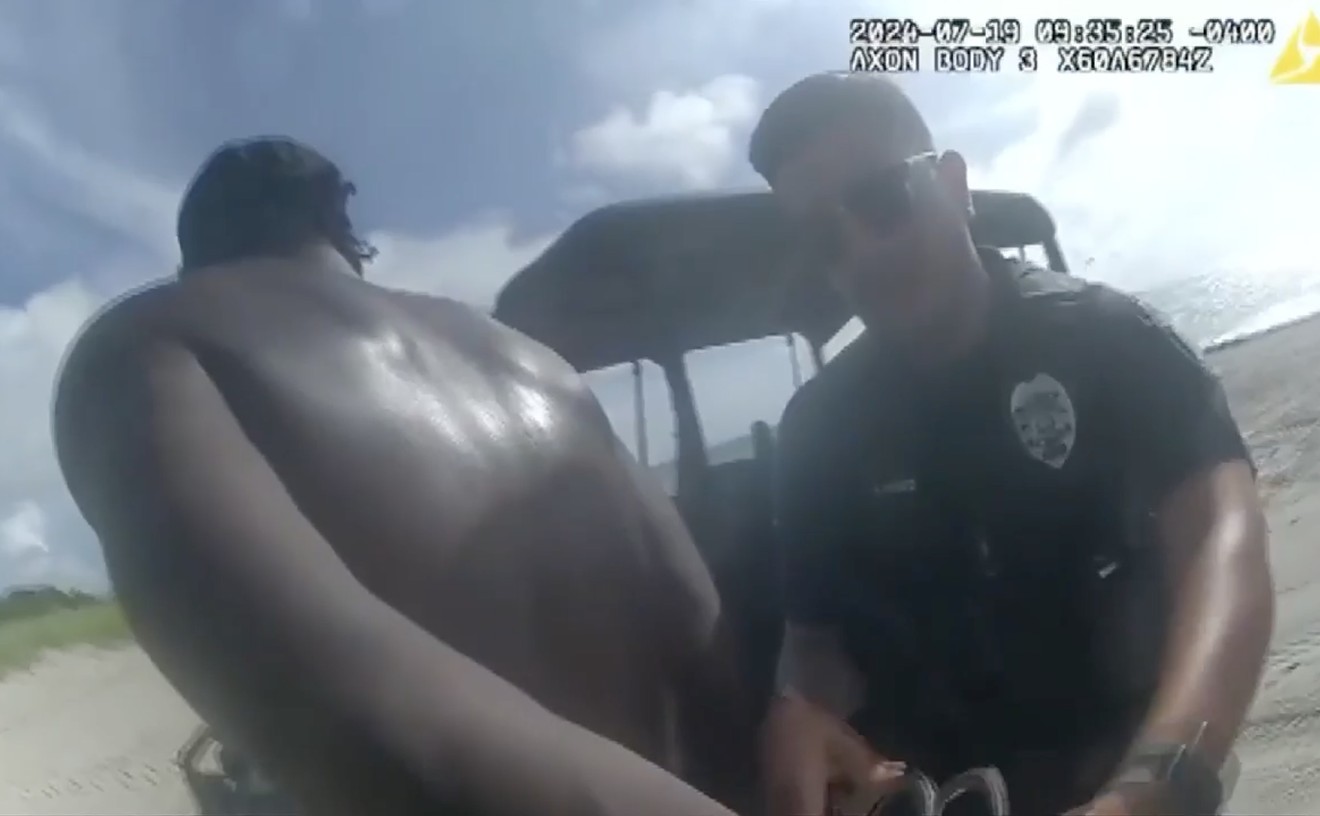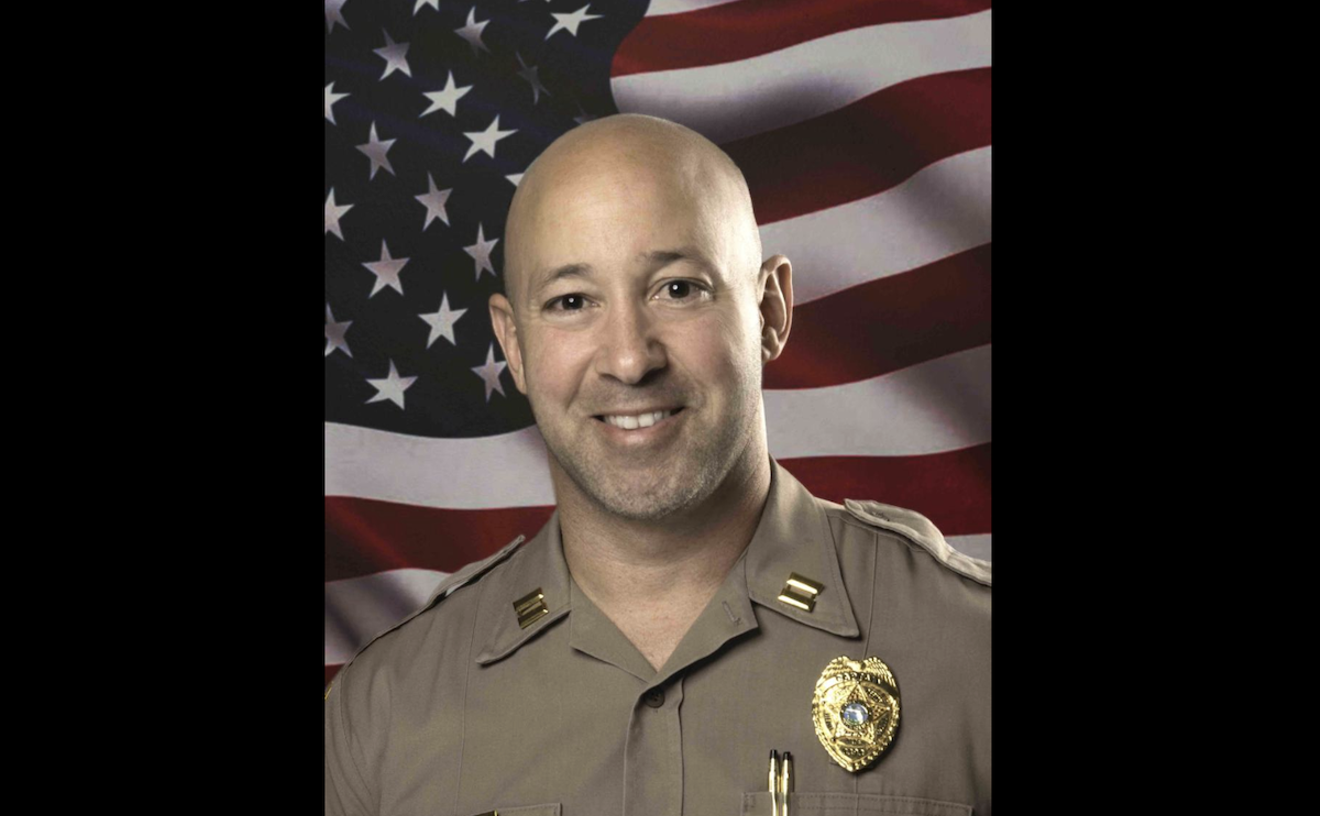Scott this week issued an utterly insane and dangerous press release calling for President Donald Trump to use an emergency-powers declaration in order to build his inane wall on the U.S.-Mexico border. In addition to being stupid, this is an extremely dangerous idea. Academics who study autocratic rulers say that a move such as this echoes that of strongmen elsewhere around the world. Given that Scott keeps outlandishly attacking the basic concept of small-"D" democracy, we figured we catalogued his continued slide toward authoritarianism:
1. In 2012 his office conducted a voter roll purge that violated federal law:
A few months before the 2012 presidential election, Gov. Rick Scott sold a massive voter purge as a way to eliminate hundreds of "non-citizens" who were supposedly threatening democracy. Instead, the effort was a xenophobic joke. In Miami alone, hundreds of mostly Latino voters were forced to prove their citizenship just to be able to cast a ballot, including one man who'd earned a Bronze Star fighting in World War II's Battle of the Bulge.2. He fought against restoring voting rights to the formerly incarcerated and pretty obviously favored white Republicans over black Democrats:
Scott's real motivation was always baldly obvious: Suppressing Democratic turnout for the Obama-Romney race. And now a federal appeals court has agreed. In a stinging 32-page opinion, the three-judge panel says Scott broke federal law.
The ruling by Atlanta's 11th U.S. Circuit Court of Appeals leans on a federal law barring any "systemic" removal of voters within 90 days of a federal election.
The panel found 2-1 that that's exactly what Scott's administration did in 2012, with Judge Adalberto Jordan, a UM law school grad and Cuban immigrant, casting the deciding vote.
The purge, you might recall, was just the latest in a harebrained and legally dubious run of schemes by the Scott administration to try to help the GOP win Florida's crucial swing state electoral votes in 2012.
First, he chopped down on early voting days, which tend to help left-leaning, less affluent voters who have less work flexibility to vote on Election Day. Then he imposed onerous new rules on voter registration groups. He even eliminated early voting on the Sunday before Election Day — a day significant because for years it's been when traditionally black churches led their congregations to the polls.
Florida's law banning ex-felons from voting was written during the Jim Crow era to prevent black people from going to the polls. In February, federal Judge Mark Walker finally threw that racist law out after a group of ex-felons sued. The judge left the door open for Gov. Rick Scott's office to come up with a fix on its own.3. Floridians had to threaten and sue his administration to get him to extend voting deadlines or open more polling spots in 2018. He callously refused to extend registration deadlines after Hurricane Matthew, for example:
But instead, Walker wrote in a new order yesterday, Scott's office is still claiming "the current scheme is all sunshine and rainbows." The judge has issued an even harsher ruling attacking what he calls an obviously flawed voting-rights system that Scott himself made harsher in 2011. Walker is giving Scott 30 days (until April 26) to come up with a new, fairer system.
Under Florida's current rules, the governor can refuse to restore voting rights on a whim for effectively any reason. Walker held earlier this year that such a system is "arbitrary," "capricious," and can clearly be gamed to favor voters from one political party or another. Now, Walker is forcing the state to rewrite that system. Importantly, the judge held that Florida technically can still ban felons from voting automatically — but there needs to be a system in place for people to regain their rights that is fair and works according to basic rules.
"This court concluded that Florida’s arbitrary slow drip of vote restorations violates the U.S. Constitution — but that does not mean defendants can shut off the spigot of voting rights with a wrench, yank it from the plumbing and throw the whole apparatus into the Gulf of Mexico,” Walker wrote.
The ruling is another victory for justice-reform advocates across the state, who have been fighting to fix the felon-disenfranchisement system for decades. Thanks to a petition campaign run by Desmond Meade, a former felon who went on to become a lawyer and activist, Floridians will vote in 2018 on whether to kill the state's automatic disenfranchisement of felons. Florida is one of only three states that automatically bans felons from voting for life, and due to that provision, one in four disenfranchised felons nationwide lives in Florida. Thanks to a transparently racist criminal justice system designed to punish people of color more harshly than whites, roughly one in four black Floridians cannot vote because of a prior felony conviction.
The provision's history is steeped in outright intolerance: W.J. Purnam, one of the post-Civil War state legislators who led efforts to add the felon-voting-ban to the constitution, said after his victory that the law would prevent Florida from becoming "niggerized."
Racism aside, the process of restoring rights to felons these days is utterly random. In his previous ruling, Walker noted cases where people convicted of the exact same crime were given differing clemency rulings, including at least one case in which Scott gave a white Republican his voting rights back while denying those rights to multiple black Democrats convicted of the same offense. People complained that ex-Gov. Jeb Bush only restored rights to one-fifth of the 385,522 people who applied to his office for clemency, but Scott — who has denied 92 percent of the applications he's received — makes Jeb! look downright compassionate.
Empathy isn't exactly a major part of Rick Scott's brand. Before taking the governorship, Scott had the distinct honor of running the company that stole the most money from Medicare — the government agency that gives health care to poor people — in history. Things haven't progressed much since he took office.4. A new, GOP-led report confirms that he completely made up claims that his election was being "stolen" from him in 2018:
Thankfully, Florida has an entire judicial system to keep Scott in check. And today a federal judge shot a torpedo into one of Scott's more unconscionable actions as governor: refusing to let people register to vote after a Category 4 hurricane destroyed parts of Florida last week.
Normally, Florida's voter registration deadline would have ended this past Tuesday. But after the Florida Democratic Party sued Scott, U.S. District Judge Mark Walker on Monday extended the date by one day. Today, Walker officially pushed the deadline back to October 18, giving Floridians affected by Hurricane Matthew six additional days to register.
"We are thrilled the court agreed to extend the voter registration deadline a full week following Hurricane Matthew," Florida Democratic Party Chair Allison Tant said in a statement. "While we wish it had not taken a lawsuit to get the Scott administration to do the right thing, today's ruling is a major victory for all Floridians and for the democratic process in the Sunshine State."
As Matthew tore up Florida's east coast, many residents — most of them Democrats — urged Scott to extend the registration deadline. Scott wouldn't exactly have been breaking with his party on this: South Carolina's Republican Gov. Nikki Haley did exactly that last week. Yet Scott, who just so happens to chair Donald Trump's political action committee, steadfastly claimed voters had "had a lot of time" to sign up already.
While Broward Supervisor of Elections employees counted ballots after this past November's vote, an angry crowd gathered outside the door.5. Now he's just asking Trump to declare a fake "state of emergency" in order to build the wall:
The riled Republican protesters carried signs accusing those inside the Lauderhill office of stealing the election. They waved Trump flags and chanted against socialism and for draining the swamp. Most of the venom was aimed at the supervisor of elections, Brenda Snipes, whom they openly accused of fraud.
"Lock her up!" they chanted, echoing the infamous chorus of the 2016 Republican National Convention.
The protesters were following the lead of President Donald Trump, who had accused the Broward elections office of "dishonesty" on television and followed up with a signature Trump tweet storm in which he claimed he was sending lawyers to "expose" the fraud and that Snipes was trying to steal the election. Trump then declared "law enforcement is looking into another big corruption scandal having to do with election fraud" in Broward. There was no law enforcement investigation at the time of his tweet. Trump suggested Snipes herself had voted 300 times. He even alleged, wildly, that Snipes would have done a "number" and "falsified" a victory for Hillary Clinton over him in 2016 if the race had been close enough.
"Bad things have gone on in Broward County," he said during an impromptu press conference. "What's going on in Florida is a disgrace."
Well, now the actual facts are in and they appear to put the lie to Trump's very serious allegations against Snipes, as well as to similar slanderous accusations made by Sen. Rick Scott. New Broward elections chief Peter Antonacci, a Republican appointed by Scott, quietly issued his memo last week on “all that happened” during the election, comprehensively titling it “What Went Wrong.” (Full text can be found below.)
And, lo and behold, the memo does not include the words “fraud” or “steal." Antonacci found no evidence of ballot tampering, no evidence of corruption, in fact no evidence of any wrongdoing whatsoever. Instead, he alleges the problems and delays of the Broward counting process were caused by "deficient management" that led to a shortage of staff and equipment that hampered the vote counting.
In describing the alleged problems, Antonacci reveals that Broward election employees, even as Trump was ginning up a crisis on Twitter and his followers raged outside their doors, were simply doing their duty and faithfully counting the votes.
“I have observed good things in the office as well,” Antonacci wrote. “Most notable is the dedication and work ethic of the majority of the SOE team.”
Sen. Scott, whose own votes were being counted in his razor-thin Senate race with Bill Nelson at the time, was just as bad as Trump in stirring up the chaos. During a nighttime press conference, a clearly agitated Scott accused Snipes of trying to "steal" the election and made a flurry of allegations, including criminal misconduct, against Snipes without evidence.
"Every Floridian should be concerned there may be rampant fraud happening in Palm Beach and Broward Counties," said Scott, who was then governor of the state. "I will not sit idly by while unethical liberals try to steal this election from the great people of Florida. Every day since the election the left-wing activists in Broward County have been coming up with more and more ballots out of nowhere. Everybody knows what is going on."
Here Scott, with his claim that "unethical liberals" were trying to "steal" the election, was clearly riling up his conservative backers, and the end result, after all the irresponsible rhetoric, was the mad days-long circus outside the elections office. It included a ranting U.S. congressman, Matt Gaetz, screaming that the elections office was a "safety hazard" and interrupting an elections official as she shared information with the media.
So could it be that Trump and Scott outright lied and slandered Snipes (and Broward County itself) in an attempt to mislead the public, create confusion and anger, and cloud the counting process at a time it didn’t seem to favor the Republican candidates?
As shocking as that might seem (sarcasm intended), all signs point in that direction — and Antonacci’s comprehensive memo all but confirms it
Senator and flesh-hungry Nordic draugr Rick Scott has spent a lot of time lately attacking Venezuelan strongman Nicolás Maduro. He is, in Scott's estimation, a "dictator."
Scott's tough talk, though, would be a lot less hypocritical if Florida's newly minted U.S. senator weren't also begging President Donald Trump to do some very dictator-like things of his own.
Today Scott issued a media release declaring that Trump should declare a state of emergency to fund the inane border-wall project. This is, as many historians have noted lately, a truly terrifying idea. Declaring a fake emergency to leapfrog governmental checks and balances is a thing that dictators, authoritarians, and strongmen do. Though a move like that wouldn't turn the United States into North Korea overnight, it would be a massive step toward Trump-branded autocracy.
"President Trump has tried to work with Congress to get something done," Scott announced, "but if the Democrats continue to refuse to work with him, then the President needs to use his emergency power to fund border-security and include a permanent solution for DACA and TPS."













